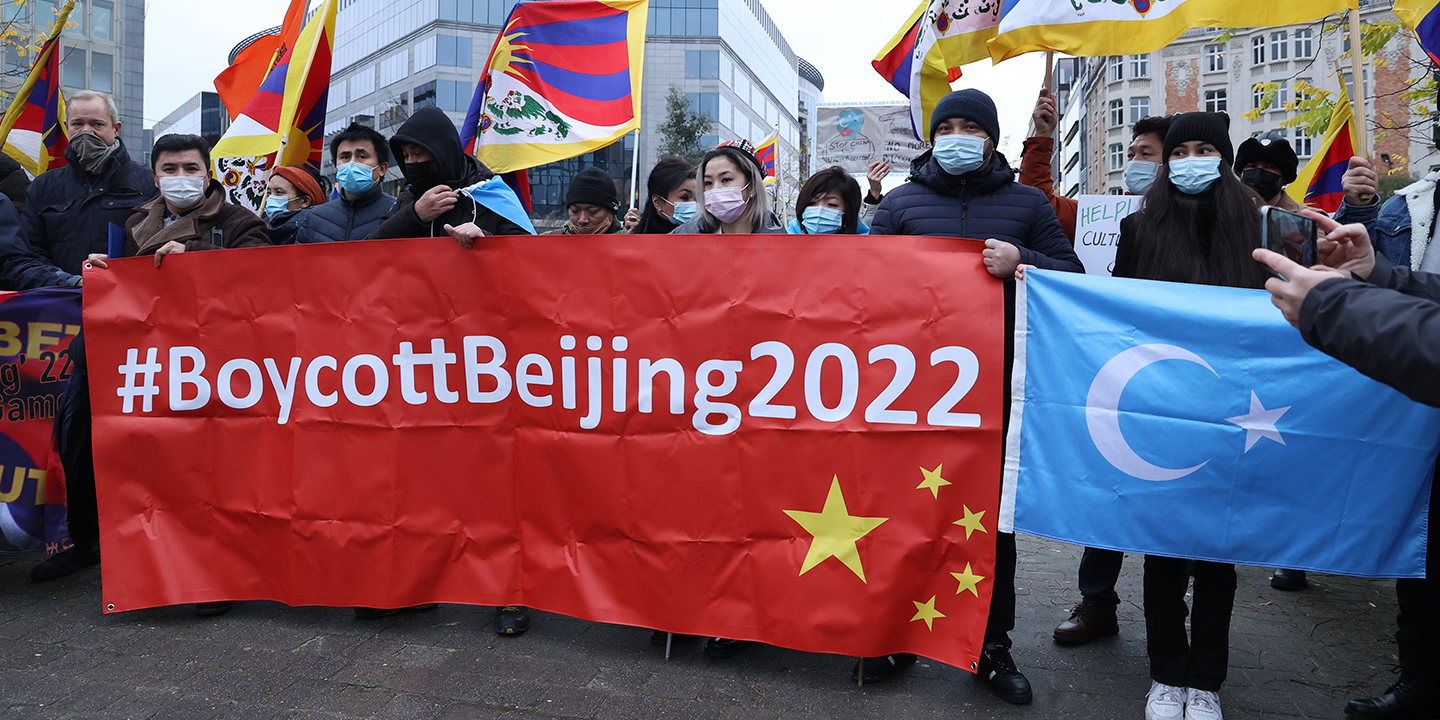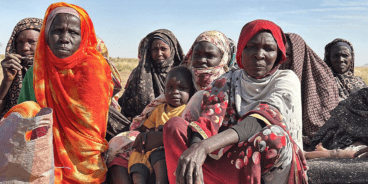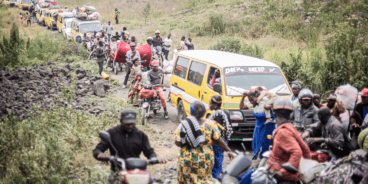

Atrocity Alert No. 286: China, Afghanistan and South Sudan
Atrocity Alert is a weekly publication by the Global Centre for the Responsibility to Protect highlighting situations where populations are at risk of, or are enduring, mass atrocity crimes.
THE OLYMPICS BEGIN THIS WEEK IN BEIJING AS ATROCITIES CONTINUE IN XINJIANG
On 4 February the 2022 Winter Olympics will begin in China’s capital of Beijing as the government continues to perpetrate genocide and crimes against humanity in the Xinjiang Uyghur Autonomous Region (XUAR). China’s numerous abuses against the Uyghurs and other majority-Muslim ethnic groups include large-scale arbitrary detention, torture, forced labor, enforced disappearances, and repressive population control policies, such as forced sterilization. In hosting this prestigious athletic event, which the International Olympic Committee claims will be a “force for good,” the Chinese government is seeking to distract the international community from its ongoing atrocity crimes through the practice of “sportswashing.”
More than 240 civil society groups have called for countries to diplomatically boycott the Games. To date, only a handful of governments – including Australia, Belgium, Canada, Lithuania, the United Kingdom, and the United States – have announced that they will not send political representation to the Olympics due to China’s human rights abuses. UN Secretary General António Guterres is planning on attending the Games. Olympic corporate sponsors – such as Omega, Samsung, Toyota, Visa, Airbnb, and Coca-Cola – have remained silent on China’s human rights abuses.
Meanwhile, China recently agreed to allow the UN High Commissioner for Human Rights, Michelle Bachelet, to visit XUAR. However, China will permit the visit only after the conclusion of the Olympics and on the condition that the trip be “friendly” and not framed as an investigation. High Commissioner Bachelet has requested unfettered access to XUAR for more than three years. The timing of the invitation may be an attempt by the Chinese government to limit human rights scrutiny during the Olympics and to delay the release of the Office of the UN High Commissioner for Human Rights’ (OHCHR) forthcoming report on human rights in XUAR.
Liam Scott, Research Associate at the Global Centre for the Responsibility to Protect, said that, “the fact that a government that continues to perpetrate atrocities is hosting the Olympics engenders a sense of normalcy and risks legitimizing the grave abuses facing the Uyghurs.” It is imperative that High Commissioner Bachelet visit XUAR as soon as possible, but only if she has unimpeded access to investigate human rights abuses in the region. OHCHR should also immediately release its report on XUAR.
UN SECRETARY-GENERAL CALLS FOR HUMAN RIGHTS MONITORING UNIT FOR AFGHANISTAN
Today, 2 February, the UN Secretary-General publicly released his report on the United Nations Assistance Mission in Afghanistan (UNAMA), recommending to the UN Security Council that a Human Rights Service be implemented under UNAMA. Notably, this Human Rights Service would monitor and report on the situation for civilians in Afghanistan, as well as advocate for the protection and promotion of fundamental rights for all Afghans.
Since the Taliban militarily seized control of the country in August 2021, vulnerable populations – including former civil servants, journalists, human rights defenders, religious minorities, and women and girls – have endured a series of targeted human rights abuses. UNAMA and the Office of the UN High Commissioner for Human Rights (OHCHR) have received more than 100 credible reports of extrajudicial killings of former Afghan security personnel in the last five months. Despite assurances from Taliban authorities of general amnesties for members of the former government, at least 72 incidents of extrajudicial killings were attributable to the Taliban. UNAMA and OHCHR also received 59 credible reports of arbitrary detentions, beatings and threats against previous Afghan government officials, journalists and human rights defenders.
Compounding these abuses is a pattern of restrictions on fundamental rights, including limited freedom of religion and expression, imposed by Taliban authorities. Reports indicate institutionalized large-scale and systematic gender-based discrimination and violence against women and girls, including forced marriage, as well as restrictions on freedom of movement, freedom of expression, employment opportunities and access to education and healthcare. The Secretary-General’s recommended Human Rights Service would specifically address these concerns, particularly the rights of women and girls, the prevention and elimination of gender-based violence, and the prevention of torture and promotion of the rights of detainees.
In the report, the Secretary-General emphasized that, “the respect and protection of the human rights, freedoms, and well-being of the Afghan people, regardless of gender, age or ethnicity, and their capacity to fully and equally participate in all aspects of the social, economic and political life of the country are essential elements of an inclusive, stable and prosperous society.” He further called upon the Taliban de facto authorities to take immediate steps to ensure human rights-compliant policies and to guarantee that Afghan women will be able to fully exercise their rights and freedoms.
Ahead of UNAMA’s mandate renewal on 17 March, the Security Council should implement the Secretary-General’s recommendations and ensure the creation of a Human Rights Service. The renewed UNAMA mandate should also guarantee mechanisms through which risk factors for future atrocity crimes in Afghanistan can be addressed.
INTER-COMMUNAL VIOLENCE ON THE RISE IN SOUTH SUDAN
On 23 January armed youth from the Murle community carried out attacks and cattle raids in several villages in Jonglei State, South Sudan, in the latest incident of sub-national and inter-communal violence. The armed youth attacked Dungrut and Machined villages, killing at least 32 people from the Dinka Bor community, including women and children. Approximately five houses were burned and other civilian properties looted. Following the attacks, on 25 January the United Nations Mission in South Sudan stressed that, “all efforts must be made to restore calm, refrain from engaging in further violence and to promote peace and reconciliation.”
The assaults in Jonglei State are not isolated incidents, but part of a broader pattern of inter-communal violence and attacks against civilian populations that impact several parts of the country. The UN Secretary-General reported that between 1 September and 31 October, an estimated 66 people were killed by inter-communal clashes and revenge attacks in the northwestern region of Greater Bahr el Ghazal alone.
Despite the signing of the peace agreement more than three years ago, and the establishment of the Transitional Government of National Unity (TGoNU) nearly two years ago, the situation in South Sudan remains concerning. The peace agreement and formation of the TGoNU were supposed to provide an opportunity for reconciliation and address the underlying causes of conflict. However, senior political and military leaders continue to manipulate long-standing enmities between rival ethnic communities. Slow implementation of the peace agreement, as well as the mobilization of forces along ethnic lines and internecine power struggles within the government, have led to a sharp increase in localized and inter-communal violence in various parts of the country.
Continuous insecurity, together with the COVID-19 pandemic and severe weather conditions, have further exacerbated the already dire humanitarian situation in South Sudan, with 8.3 million people – almost 75 percent of the population – in need of humanitarian assistance. In December the UN reported an increase in the number of armed attacks against civilians since March 2021, in particular against humanitarians and humanitarian assets. Five aid workers were killed while undertaking their work during 2021, bringing the total to 129 since 2013.
Juliette Paauwe, Senior Research Analyst at the Global Centre for the Responsibility to Protect, stated that, “given the complexity of the security situation in South Sudan, all parties must genuinely commit to the implementation of the outstanding provisions of the peace agreement, and adopt a long-term strategy for national reconciliation and healing to further prevent localized violence, including by unifying the command of the armed forces and addressing local competition for access to resources and power.” The government must also ensure the protection of humanitarian workers and facilitate their unhindered access to vulnerable populations, as well as thoroughly investigate all attacks on humanitarian organizations and hold perpetrators accountable.
Related Content


Atrocity Alert No. 427: Sudan, Democratic Republic of the Congo and Afghanistan
